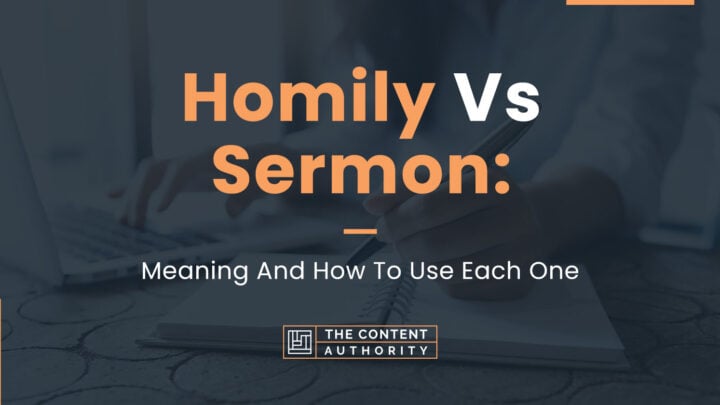Homily vs. sermon, what is the difference between these two terms? Most people will argue that they are identical because of their closely-related definitions. Find out if this is true or not in this article.
A homily is a non-doctrinal discourse or sermon based on a Biblical topic or inspirational saying. In contrast, a sermon is a lecture or discourse that provides religious instruction or exhortation. A sermon is usually based on a Biblical text or scripture and delivered by a clergy member or leader.
The confusion between the words “sermon” and “homily” is understandable because they are related to religion. However, would you like to know their differences? What about their detailed definitions and usage in sentences? Read on to find out all that and much more.

Definitions Of Homily And Sermon
English is the most popular and vast language globally. That explains why many English words are somehow related. For this reason, the English dictionary exists to provide definitions for each word and its distinctive elements. Here are the definitions of “homily” and “sermon” according to major dictionaries.
Definition Of Homily
A homily is a sermon concerning a practical matter. A homily typically follows a reading of a scripture or a specific Biblical story, then a practical explanation of its text. For instance, a church elder may choose a particular scriptural passage and read it to the congregation or audience, then find practical examples to put the message in a relevant context.
For example, “None of the sermons on Sunday, besides the homily, made sense to the audience.”
You can trace the word “homily” to the 14th Century Old French Word “omelie,” coined from the 12th century’s French “homelie.” Other sources suggest that the word comes from Church Latin “homilia,” meaning “a conversation or sermon.’ In Greek, “homilia” means “a discourse or conversation.”
This word also has Biblical roots. For instance, the New Testament uses “homilos” to describe “an assembled crowd or a discourse with a group.” In the 16th century, the English translation “homily” came about.
Secondary Definitions Of Homily
This word has other different but closely-related definitions. For instance, a homily is an inspirational saying. For example, “The speaker used the homily to inspire his audience.”
Another meaning for homily is “a moralizing lecture or warning that is often condescending. For example, “The crowd shouted when they understood the meaning of the homily presented by James.”
Definition Of Sermon
A sermon is a discourse for religious instruction or exhortation. It focuses on a text or scripture delivered by a religious leader or a clergy member. Also, a sermon is a part of a religious service. You can also refer to a sermon as a written or spoken address on a religious or moral issue. For example, “Pastor Martin gave a powerful sermon today.”
This word originates from the 12thcentury Anglo-French and Old French words, “sermoun and sarmun,” meaning “a preached discourse upon a text of scripture.” Sources also claim that the word’s root is Latin “sermonem,” which means “a continued speech, conversation, common talk, discourse, manner of speaking, or literary style.” Its induction into the English dictionary happened in the late 13th century.
Are there secondary definitions of “sermon?” Yes. Another definition of “sermon” is “a serious talk on behavior or responsibility given by an elder and is especially long and tedious.” For example, “My mother gave us a long and boring sermon about our online activity when the news of the murdered teenager broke.”
Sermon vs. Homily: What Are The Differences?
A sermon is a religious discourse based on a Biblical scripture given by a minister, preacher, or member of the clergy in a church during a religious service. On the other hand, a homily is a discourse or conversation that starts with reading scripture and explaining it practically.
The primary difference is that a sermon aims to provide religious instruction, while a homily seeks to put scripture in practical contexts.
Another difference is that a clergy member usually gives a sermon, while anyone can give a homily. Also, a sermon is typically part of a religious service, while a homily is not necessarily.
Additionally, the word “homily” originates from Old French in the 12th century, while “sermon” comes from 12th-century Anglo-French. Finally, the sermon is a general term for long moral conversations or instructions, while a homily is a type of sermon.
How To Properly Use Homily And Sermon In A Sentence
The words “sermon” and “homily” are nouns. Therefore, you should keep this in mind when using them in sentences. Here are the basic rules for applying these nouns in sentences;
How And When To Use Homily
Use this word as a common noun for a religious discourse whose primary intention is for spiritual enlightenment instead of instruction. For example, “Mary and group mates prepared a homily for the class.”
Another context where you can use this word is when referring to an expression that people often use because it is interesting, inspirational, or thoughtful. For example, “The homily from Shakespeare’s Romeo and Juliet never ceases to inspire.”
Something else you should consider when using this word in sentences is its placement. For instance, since it is a common noun, you can place it after a noun to indicate that it is the sentence subject. For example, “We read the homily to the entire class.”
How And When To Use Sermon
Use this word to describe a talk on a religious or moral topic especially given during a church service, based on a passage or scripture from the Bible. For example, “The Minister’s sermon was long and tedious.”
Another context where you can use this word is to describe a long piece of admonition or reproof, advice, or counsel to resolve a problem. For example, “The teachers gave us a long sermon on proper etiquette before the guests arrived.”
Also, use this word in a sentence to refer to a lesson derived from a story or experience. For example, “Mr. Anuar gave a long sermon after making us watch the play from start to finish.”
Additionally, ensure not to forget the basic sentence construction and grammar rules when constructing sentences with this noun. For instance, when using it as the object of your sentence, it should come after the verb. For example, “Sandra read the sermon before the sermon.”

List Of Examples Of Homily And Sermon In Sentence
Below are some examples of sentences with these words;
Example sentences of “homily”
- The homily was easily understandable because of its popularity.
- We remember Martin Luther for his iconic homily.
- The minister delivered the homily so flawlessly and confidently.
- Mr. Smith loves to use a homily for a moral lesson during his classes.
- The homily during the Sunday service was long and boring.
Example sentences of “sermon”
- My mother gave us a long sermon when we got home late for the third time this week.
- The Catholic Father loves a long sermon.
- The long sermon at the Sunday service put the students to sleep.
- The boring sermon by Mr. James was a waste of time because most students slept through it.
- I am not prepared to give a sermon at the assembly.
Conclusion
“Homily” and “sermon” are closely-related words because a homily is a type of sermon. However, a few distinct elements, like their purposes, set them apart. For instance, a homily aims to inspire, while a sermon aims to give instruction or admonish. Now that you know their differences and how to use them in sentences, feel free to share your creative sentences using the words with those around you.
Shawn Manaher is the founder and CEO of The Content Authority. He’s one part content manager, one part writing ninja organizer, and two parts leader of top content creators. You don’t even want to know what he calls pancakes.

